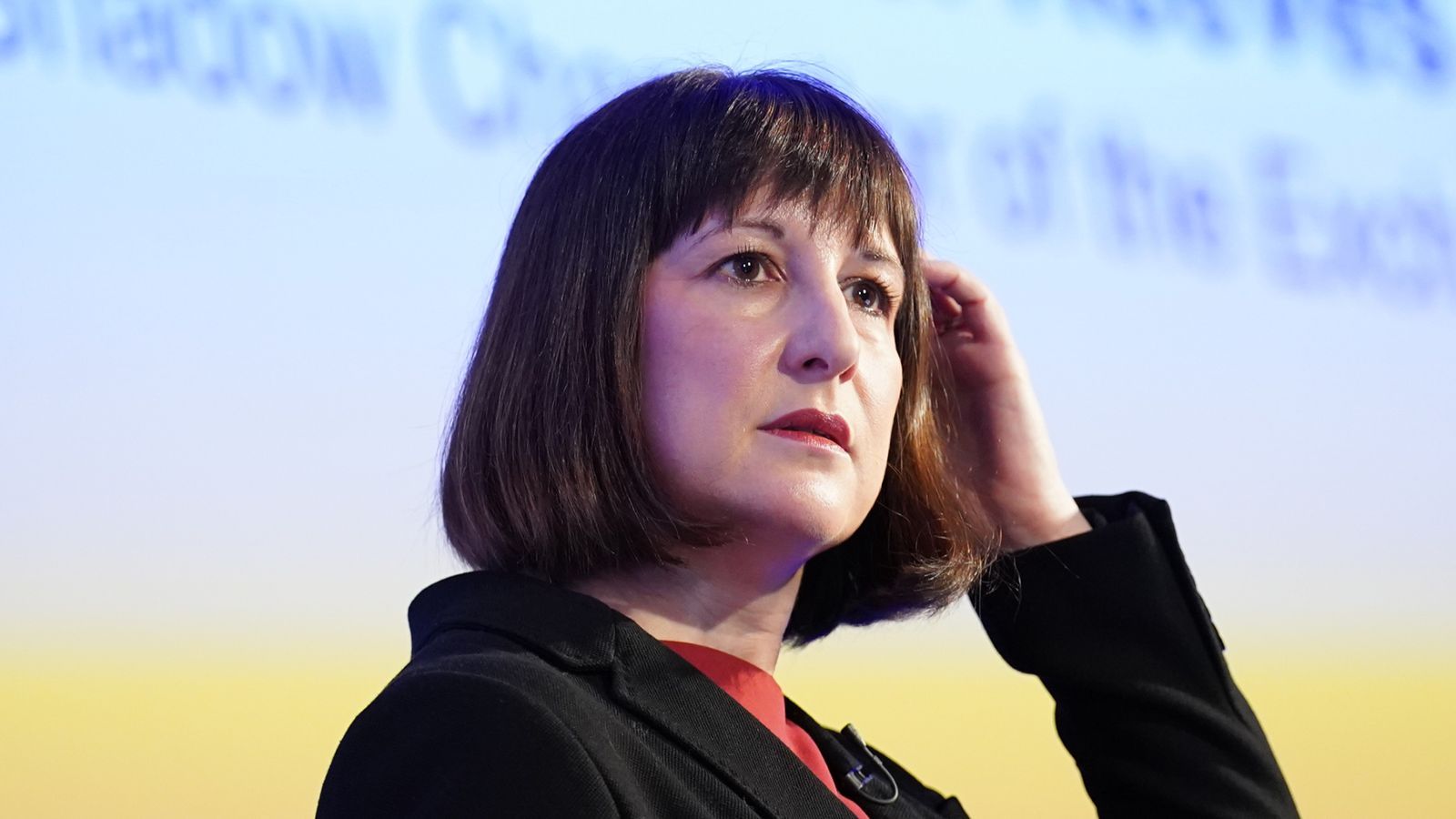Rachel Reeves has defended her decision not to restore a cap on bankers’ bonuses, arguing businesses do not need “more chopping and changing”.
The shadow chancellor said that when the government scrapped the cap under Liz Truss, Labour did not “feel that was the right priority in that budget”.
But she said much stronger rules were now in place since the 2008 financial crash, when the cap was first introduced, and that it was no longer her priority to restore it.
“What I hear loud and clear from business is that what it will take to get them to invest in Britain is stability and the last thing they need is more chopping and changing,” she said.
“The chopping and changing has got to end if we’re going to give stability to business and that’s why we will not be bringing that back.”
Politics latest:
Labour ‘under no illusions about scale of task ahead’
Addressing Labour’s business conference in central London this morning, Ms Reeves also announced she would not increase the headline rate of corporation tax of 25% during the first term of a Labour government but left the door open to changes in the rate in the future.
She said: “There have been 26 changes to our corporation tax arrangements in this parliament alone. We can’t go on like this.
“The next Labour government will make the pro-business choice and the pro-growth choice: We will cap the headline rate of corporation tax at its current rate of 25% for the next parliament.
“And should our competitiveness come under threat, if necessary we will act.”
Ms Reeves also said Labour would maintain full expensing and the annual investment allowance and would provide a “road map” for business taxation within the first six months of government.
Ms Reeves has sought to portray herself as pro-business during her time as shadow chancellor, in contrast to her predecessor John McDonnell, who led Labour’s economic policy when Jeremy Corbyn was the leader of the Opposition.
Will Labour stick to £28bn a year green pledge?
However, the shadow chancellor is facing scrutiny over Labour’s pledge to spend £28bn a year on green projects until 2030 if the party comes into power.
In a Q&A following her speech, Ms Reeves failed to commit to the policy, which some in Labour want Sir Keir Starmer to drop because it allows the Conservatives to cast doubt on the party’s commitment to fiscal discipline.
Asked by Sky News’s political editor Beth Rigby whether the pledge had become “an albatross around your neck” that “threatens to unravel all the hard work you’ve done to be trusted with economic competence”, Ms Reeves said there were “big opportunities to invest alongside business in the jobs and the industries of the future”.
Please use Chrome browser for a more accessible video player
But she said it was “absolutely essential that all of our policies are consistent with our fiscal rules” and that the green prosperity plan “was no exception to that”.
The shadow chancellor said that after the next budget, the party will “set out our plans and ensure they are consistent with our fiscal rules because they will always take precedence to guarantee the economic security of family finances and of businesses as well”.
Tories attack Labour over bonus cap change
The cap on bankers’ bonuses was first introduced in the wake of the 2008 financial crisis to limit annual payouts to twice a banker’s salary, but it was scrapped by former chancellor Kwasi Kwarteng during Ms Truss’s short time as prime minister.
During Prime Minister’s Questions this week, Rishi Sunak seized on the issue to argue that voters “cannot trust a word he [Sir Keir Starmer] says”.
“I was genuinely surprised that, after recently and repeatedly attacking not just me but the government for lifting the bonus cap, the shadow chancellor has announced, just today, that she now supports the government’s policy on the bankers’ bonus cap.”
Read more:
Starmer promises to ‘fix stagnation’ in pitch to business
Labour reports to underpin new ‘party of business’ stance
Please use Chrome browser for a more accessible video player
Ms Reeves and other senior Labour figures had been vocal critics of the government’s decision to axe the cap during a cost of living crisis, saying only three months ago that the decision to allow unlimited bonuses to be earned again “tells you everything you need to know about this government”.
The issue has caused some division within Labour, with Anas Sarwar, the party’s leader in Scotland, previously criticising Ms Truss as a “Thatcher tribute act” who would rather “boost bankers’ bonuses than help those in need”.
He told reporters in Westminster today that he stood by his previous words but added: “You have got to look at it in the balance. We have got to inspire confidence for them to make the strategic investments, but we can’t return to a situation where they get away with it.
“I’m not here to defend bankers’ bonuses, I’m not here to defend banks. That is something the UK Treasury has got to keep an eye on.”
Stephen Flynn, the SNP’s leader in Westminster and Labour’s main opponent in Scotland, sarcastically praised Mr Sunak for convincing the Labour Party to agree to a “bleak future”, saying it was a “great achievement” for the government.









